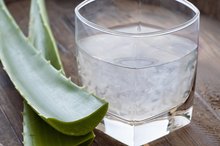What does fact checked mean?
At Healthfully, we strive to deliver objective content that is accurate and up-to-date. Our team periodically reviews articles in order to ensure content quality. The sources cited below consist of evidence from peer-reviewed journals, prominent medical organizations, academic associations, and government data.
- "National Health Statistics Reports"; Complementary and Alternative Medicine Use Among Adults and Children; Patricia M. Barnes, M.A., Barbara Bloom, M.P.A., and Richard L. Nahin, Ph.D., M.P.H.; December 2008
- MedlinePlus: Aloe Vera
- “British Journal of General Practice”; Aloe Vera: A Systematic Review of its Clinical Effectiveness; B.K. Vogler, E. Ernst; October 1999
- “British Journal of General Practice”; Aloe Vera: A Systematic Review of its Clinical Effectiveness; B.K. Vogler, E. Ernst; October 1999
The information contained on this site is for informational purposes only, and should not be used as a substitute for the advice of a professional health care provider. Please check with the appropriate physician regarding health questions and concerns. Although we strive to deliver accurate and up-to-date information, no guarantee to that effect is made.
Aloe Vera & Liver Damage
Four out of 10 U.S. adults used complementary and alternative medicine in 2007, as reported by the National Center for Complementary and Alternative Medicine 1. That same year, 18 percent of adults took non-vitamin, non-mineral natural products such as aloe vera. Limited scientific evidence exists for the use of aloe to treat disease. Moreover, the National Institutes of Health is concerned that chronic high-dose ingestion of aloe vera may induce liver inflammation.
If you are experiencing serious medical symptoms, seek emergency treatment immediately.
Aloe Vera
Aloe vera is native to Africa and commercially cultivated all over the world. The spiky succulent plant is a source of vitamins, minerals, sugars, enzymes and amino acids, as outlined in the British Journal of General Practice. According to the NIH, there is good evidence for the alleviation of short-term constipation through aloe ingestion. The evidence, however, is unclear for the use of aloe in diabetes, ulcerative colitis and cancer prevention.
- Aloe vera is native to Africa and commercially cultivated all over the world.
- The evidence, however, is unclear for the use of aloe in diabetes, ulcerative colitis and cancer prevention.
The Liver
Is Aloe Vera Gel Safe to Take Internally?
Learn More
Situated in the right-upper quadrant of the abdomen, just below the diaphragm, the liver is the largest solid organ in your body. As related by the British Liver Trust, the reddish-brown gland performs over 500 important functions. In addition to making proteins and enzymes for chemical reactions, it removes toxins from the blood and regulates hormones. The food you eat is digested by bile made in the liver and converted into energy. Energy that isn’t used quickly is stored in this vital organ for use during fasting states, like sleeping. The liver also plays a critical role in immune defense.
- Situated in the right-upper quadrant of the abdomen, just below the diaphragm, the liver is the largest solid organ in your body.
- Energy that isn’t used quickly is stored in this vital organ for use during fasting states, like sleeping.
Evidence
In a 2005 article in the “World Journal of Gastroenterology,” German researchers reported on a 57-year-old woman who presented with severe acute hepatitis after taking aloe vera capsules for four weeks. Her symptoms resolved after discontinuing the supplement.A similar case occurred in the U.S., as described in 2007 in the “Annals of Pharmacotherapy.” Acute hepatitis symptoms abated after a 73-year-old woman discontinued aloe vera supplementation. “Journal of Korean Medical Science,” in 2008, also published a case report. When a 62-year-old woman stopped taking aloe extract, her severe hepatitis resolved.
- In a 2005 article in the “World Journal of Gastroenterology,” German researchers reported on a 57-year-old woman who presented with severe acute hepatitis after taking aloe vera capsules for four weeks.
Mechanism of Action
Side Effects of He Shou Wu
Learn More
The German authors attributed the onset of liver inflammation to bioactive compounds in the aloe vera plant. Alkaloids in aloe may affect liver enzyme systems in people with hypersensitivity, interfering with the liver’s detoxification function. Phytochemicals present in aloe may also trigger an immune response that damages the liver. Hypersensitivity to aloe vera was described in humans as early as 1980. An allergic skin test may determine whether you are hypersensitive to aloe.
- The German authors attributed the onset of liver inflammation to bioactive compounds in the aloe vera plant.
- Phytochemicals present in aloe may also trigger an immune response that damages the liver.
Safety
The NIH maintains that taking aloe vera for less than seven days to alleviate occasional constipation is safe, although no specific dose has been determined. Evidence supports safe topical use of aloe for psoriasis, seborrheic dermatitis and genital herpes. Cases of acute hepatitis have been reported after as little as four weeks of aloe ingestion. Tell your doctor about everything you take, including herbal supplements.
- The NIH maintains that taking aloe vera for less than seven days to alleviate occasional constipation is safe, although no specific dose has been determined.
- Evidence supports safe topical use of aloe for psoriasis, seborrheic dermatitis and genital herpes.
Related Articles
References
- "National Health Statistics Reports"; Complementary and Alternative Medicine Use Among Adults and Children; Patricia M. Barnes, M.A., Barbara Bloom, M.P.A., and Richard L. Nahin, Ph.D., M.P.H.; December 2008
- “British Journal of General Practice”; Aloe Vera: A Systematic Review of its Clinical Effectiveness; B.K. Vogler, E. Ernst; October 1999
- “World J Gastroenterol”: Acute Hepatitis Induced by an Aloe Vera Preparation: A Case Report; Christian Rabe, Annemarie Musch, Peter Schirmacher, Wolfgang Kruis, Robert Hoffmann; January 2005
- Dat, A.; Poon, F.; Pham, K. et al. Aloe vera for treating acute and chronic wounds. Cochrane Database Syst Rev. 2012 Feb 15;(2):CD008762. DOI: 10.1002/14651858.CD008762.pub2.
- Haddad, P.; Amouzgar-Hashemi, F.; Samsami, S. et al. Aloe Vera for Prevention of Radiation-Induced Dermatitis: a Self-Controlled Clinical Trial. Curr Oncol. 2013 Aug;20(4):e345-8. DOI: 10.3747/co.20.1356.
- Heggie, S.; Bryant, G.; Tripcony, L. et al. A Phase III Study on the Efficacy of Topical Aloe Vera Gel on Irradiated Breast Tissue. Cancer Nurs. 2002;25(6):442-51.
- Langmead, L.; Feakins, R.; Goldthorpe, S.et al. Randomized, Double-blind, Placebo-controlled Trial of Oral Aloe Vera Gel for Active Ulcerative Colitis. Aliment Pharmacol Ther. 2004;19(7):739-47. DOI: 10.1111/j.1365-2036.2004.01902.x.
- Paulsen, E.; Korsholm, L.; and Brandrup, F. Double-blind, Placebo-Controlled Study of a Commercial Aloe Vera Gel in the Treatment of Slight to Moderate Psoriasis Vulgaris. J Eur Acad Dermatol Venereol. 2005:19(3):326-31. DOI: 10.1111/j.1468-3083.2004.01186.x.
- Suksomboon, N.; Poolsup, N.; Punthanitisarn, S. et al. Effect of Aloe vera on glycaemic control in prediabetes and type 2 diabetes: a systematic review and meta‐analysis. J Clin Pharm Ther. 2016;41(2):180-8. DOI: 10.1111/jcpt.12382
- Zhang, Y.; Liu, W.; Liu, D. et al. Efficacy of Aloe Vera Supplementation on Prediabetes and Early Non-Treated Diabetic Patients: A Systematic Review and Meta-Analysis of Randomized Controlled Trials. Nutrients. 2016 Jul; 8(7): 388. DOI: 10.3390/nu8070388.
Resources
Writer Bio
Amy Long Carrera is a registered dietitian in Los Angeles who has been writing since 2007 for such publications as The Insider, On the Other Side and Arthritis Today. She is a certified nutrition support clinician and her writing employs current research to provide evidence-based nutrition information. Carrera holds a master of science degree in nutrition from California State University, Northridge.









